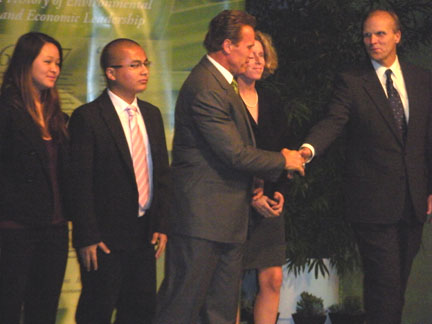
The picture below of Arnold Schwarzenegger shaking the hand of Will Graham, Head of Midland School, at the September 30 Governor's Global Climate Summit 2 is noteworthy mainly because of Midland's reputation: a tiny hippie school, a fringe school, a farm school, a therapeutic school.
Not anymore. Midland just won California's highest environmental honor, a Governor's Environmental and Economic Leadership Award (GEELA), and out of 2009's fifteen recipients it was the only school to have done so.

It's a mainstream stamp of approval for a high school with an enrollment that hovers around 90, where the students are the ones to gather and chop wood to build fires in order to heat their shower water. Nevermind that Midland graduates routinely go to top liberal arts colleges and elite universities; it couldn't seem to escape the onus of the hippie-commune-summer-camp reputation. The students are the ones to clean and maintain the classrooms. The students help prepare the food, both in the organic garden and in the kitchen, and they're the ones who wash the dishes -- though Will Graham, the Head of School shaking Arnold Schwarzenegger's hand in the photo, is a fixture in "Dish House" washing alongside freshmen after meals until he's sure they've learned the ropes.
The "closed circle" Graham describes when I ask him about Midland's most important qualities is one every student there is made aware of: the food grown in the garden is then prepared and eaten, and the scraps go back to the garden for the pigs or into compost. As with the shower fires, the school's driving ethic is a transparent relationship between individuals and the resources they use pioneered by Paul and Louise Squibb, Midland's founders, who instituted a "Needs Not Wants" policy for the school when it began in 1932 ... when Depression-era ethics were relevant. Suddenly, they're relevant again, and Midland has gone from "fringe" to "leader." Suddenly, Midland's 75-year-old "backward" perspective on community is the stuff of national leadership, and the fact that Midland stuck to its roots is "innovative."
"A lot of schools 'lapped' us," says Lise Goddard, Midland's Director of Environmental Programs. "They had fancy tennis courts put in. Now they're wondering, 'How do we get back to what we gave up?' Midland has a 75-year history of environmental ethic before there was language to describe it. It blended the individual, the community, and the environment long before there was a popular dialogue that linked those things."
The comprehensive application for the Governor's Environmental and Economic Leadership Award features pictures of smiling Midland students surrounding solar arrays (Midland sophomores put in a new one each year, and the campus is 15% powered by these panels) alongside effusive letters of recommendation from local environmental leaders such as Dr. Josh Schimel, the Chair of UCSB's Environmental Program. "I doubt there is a school in the State, and maybe the entire US, more deserving of this award," he wrote.
Keeping perspective is part of Midland's key to this particular success. "Greening campuses is usually about efficiency. That goes out the door where teenagers are concerned," Goddard acknowledges. "It's more about training and producing passionately informed kids than about producing vegetables and clean kilowatt hours."
Kirby, a gentle 15 year old from Pasadena, is one such kid on the road to being passionately informed. He was certainly more informed than I was as he showed me the two small plots out in the Midland garden he was responsible for. While using the common watering can from the common trough, he politely explained how the plot with the cover crop produced nitrogen-rich soil and why he was growing a certain kind of wheat in the adjacent one. Midland freshman are in charge of garden plots as part of "Midland 102," a course that also teaches how to properly use the library and how to locate Midland sites on topographic maps. Midland has nearly 3,000 acres, nearly 95% of which it has recently conserved as Preserved Land in accordance with the Public Land Trust.
Both Kirby and I gazed out at that oak-dotted land as we stood in the afternoon sun by his garden plot. For a few seconds, all we could hear was the water hitting the soil. But even the Governor of California understands that beneath that quietude, large and important changes are afoot.